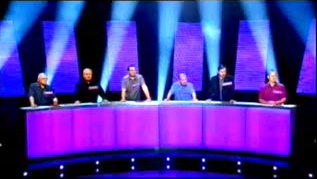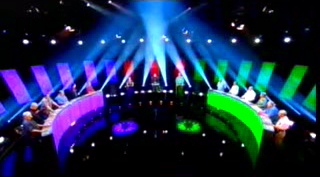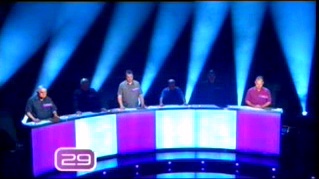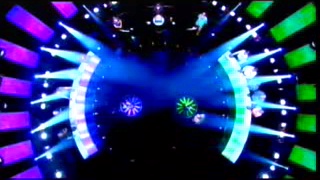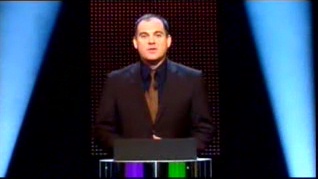Weaver's Week 2008-08-10
Last week | Weaver's Week Index | Next week
Contents |
Jam Spoons for All
"Two teams, comprising a captain and six team members, compete over two rounds in a game of intellect, nerve, strategy and skill. For the captains, it's not what they know but who they know as the winning team gains a place in the final where they will have 90 seconds to correctly answer six consecutive questions and win £2,000. But will the captain select the right players and, more importantly, can they correctly answer the captain's question to win the chance to defend their title on the next show?"
Battle of the Brains
Shine North for BBC2, 6pm weeknights
We mentioned last week that we don't usually watch Andrew Marr's programme on Sunday mornings. That's not because we don't think he does a good job: far from it, Mr. Marr is an expert in politely and gently skewering senior politicians on the kebab of their own cant. We just find his approach too rumbustuous for 9 o'clock on a Sunday morning. More to our taste is Radio 4's Broadcasting House, where there is conversation about the week just gone, rather than making the noise for the week ahead.
The host of BH for the last few years has been Paddy O'Connell, the business journalist turned – well, we're not quite sure what Paddy has turned into. Someone worth watching, usually; someone given the jobs that the BBC doesn't know how to fill, more often than is fair. His most high-profile engagement has been the weekly show on Radio 4; on television, O'Connell has spent most of his time on BBC3, hosting Celebdaq, the Eurovision Song Contest, and most of the Flashmob programmes that they ran a few years ago. All of them are infused with the trademark Paddy O'Connell wit. It's a very dry and subtle wit, one that many viewers have difficulty detecting at first.
O'Connell's first regular job on terrestrial television is on a new team quiz. Battle of the Brains has shunted the long-running Eggheads out from its 6pm position, and clearly owes a debt to the Dermot Murnaghan show. Battle of the Brains has teams competing against each other, head-to-head on a series of specialised subjects. Only the winners of each round remain for the grand finale, with the prospect of a cash prize.
Those are the similarities, and though we've summed them up in a couple of lines, there's a lot of familiar ground there. The differences are more plentiful. Firstly, both teams will leave the programme as soon as they lose. There's no resident team of boffins and their awe-struck opponents; there are two teams of quizzers. Eggheads has long had a reputation of weeding out teams that will pose a serious challenge to its regulars. On Battle of the Brains, there's usually someone who we know has done something of note – a member who has made good progress on University Challenge, or won on Come and Have a Go If You Think You're Smart Enough, or the final of Counterpoint.
The game mechanic is different from Eggheads in a most refreshing way. There are six different types of battle: the penalty shoot-out, a one-minute drill, a list, numerical estimation, clues to an answer, and the good old buzzer quiz. None of these ideas are particularly new – the 60-second drill is borrowed from Mastermind, the list is from Who Dares Wins, and the clues bring back memories of Going for Gold. None of the questions are multiple-choice, the contestants must always dredge their minds to find the answers. Not for this show the faintly ludicrous concept of asking Kevin Ashman if the third letter of the Greek alphabet is beta, gamma, or mu.
"What is the third letter of the Greek alphabet" feels like the standard of Eggheads questions. Questions on Battle of the Brains are noticeably harder. These people are being made to work hard for their victory. There's no particular change in the subject matter: though O'Connell claims fifteen subjects are in the programme, the first two weeks have shown only 14 topics: Animal Kingdom, Art, Classical World, Film and TV, Food and Drink, Geography, Great Britain, History, Literature, Music, Politics, Science, Sport, Technology and Transport. The opening credits suggest the missing subject is Nature.
The teams on the show are made up of six quizzers and a captain. The captain's role is to select the person to play each battle: they're told the subject, but not the format. The person who loses the battle is eliminated from the game, the winner will rejoin their team for the final round. The battles are designed to complete in about two minutes – the buzzer rounds are best-of-five, the number guessing is best-of-three. The lists end with the first hesitation, repetition, or deviation, and there's only one question in the Going for Gold rounds. It's not a brilliant test of the contestants, and there's just enough room to lengthen one of the formats slightly – we'd suggest making the clues a continuous stream of speech, and best of three.
After five rounds, each side will have at least one player left, and one side will clearly be in the lead. The next round is a series of sudden-death general knowledge questions, starting with the team in the lead. The captain of the opposing team must work out who amongst their opponents is least likely to answer the question correctly. If the nominated player gives an incorrect answer, they're eliminated. Repeat this process until one team loses all its members, and is eliminated.
For the final round, any eliminated members from the winning team are returned. They'll then get 90 seconds of general-knowledge questions, and must each answer one question correctly. The captain will decide who answers each question. If the team succeeds in its task, they'll win £2000 to share between them. Each correct answer turns part of the desk white, and dims the spotlight on the player; any incorrect answers will turn the desk back to its usual green or purple, and illuminate all six members of the team. It's a difficult challenge, won about once a week. The team will rarely get more than 10 or 11 questions in the time, and an error after about 40 seconds leads to an anticlimax. There is no prize for finishing with five or fewer lights on: this is an all-or-nothing endgame.
Win or lose, the team has the opportunity to return on the next show. For this finale, the roles are reversed: the team hears two questions, and must decide which their captain will answer correctly. Of course, we'll ask them the other question, just to ramp up the tension. A correct answer to the preferred question means the team returns on the next show; an incorrect answer means the team leaves with any money they've won.
From a strict quizzing point of view, we rather like this show. It's a magpie format, nicking the best bits of other shows and melding them into something greater than the sum of its parts. The presentation, sadly, is a little less inspired. There's a video wall running around the outside, used mainly to display the name of the next round and provide some eye-level colour. There's a lot of spotlights, and an overhead shot of two podia that gets a little tiresome through overuse. We're particularly unimpressed with the font used on the show: it's trying too hard to be modern and cool, and succeeds in neither endeavour. Bonus points, though, for colouring the teams purple and lime, rather than green and red.
Paul Farrer has written a faux-classical theme, containing a stab that's used (and probably over-used) before each battle in the early stages. We do like the slight variations in the theme when the losing side is fully eliminated, but we don't like the way that some rounds (particularly the penalty shoot-out) sound like they've been recorded at a table-tennis tournament. Like The Weakest Link, Battle of the Brains has no audience, and does not use canned crowd. On most editions, the remnants of the winning team give a brief ripple of applause as the losing captain walks off. Coming from about three people, it really is just a ripple, and somehow sounds cheaper than silence.
Perhaps the biggest disappointment is that Paddy O'Connell doesn't get to deploy his famous wit. Truly, he is more entertaining than the tight confines of this format allow. We reckon that his choice of brown suits was deliberate, it's clearly part of his plan to succeed Dermot Murnagahan as TV's Mister Six by invoking a previous occupant, Angus Deayton.
In conclusion, we have a fondness for this show. It's not as fun as Sudo-Q, but it's infinitely more watchable than Eggheads or the nature documentaries that seem to be staple fare at this time of day. Would we commission a second series? Very probably, and we'd lavish the unspent prize money on a slightly more impressive set, and make sure that the host could entertain, because he's good at that.
University Challenge
Match 5: Queens' Cambridge v St George's London
Last week's match was accompanied by thunder and lightning, and was accordingly gripping. This week, it's sunny, so we're expecting a less dramatic match.
Word of the week is "plug", and it goes to the captain of the St George's side. The college, part of the University of London, was founded in 1733 near Hyde Park Corner, but has since moved to the salubrious climes of Tooting. Famous alumni include Henry Gray of anatomy fame, Edward Jenner of smallpox fame, and Harry Hill of TV Burp fame.
The next starter is on apocrypha in the Harry Potter canon, and is answered by the Queens' captain. The college was founded by two different queens, and straddles the Cam via a bridge incorrectly attributed to Isaac Newton. Famous alumni include the scholar Erasmus, and the UC and QI figure Stephen Fry. The Cambridge side benefits from having two mathematicians on the team when confronted by a set of bonuses on Poincare's Conjecture. The visual round is on Royal Family Trees, specifically the Stewart-Orange family. Queens' has a good lead, 80-10.
The next starter ensures that all of the Cambridge students have correctly answered at least one buzzer question. Last week's winners didn't quite manage that. St George's come back with knowledge of the concept of entropy, but the four medical students don't quite have the native range of knowledge as the Cambridge side – two mathematicians, a historian, and a classicist. The sides aren't too hot on literature questions, guessing Byron and Shelley for a starter by Keates. We think that someone said "Foucault" as an answer, but we might have mis-heard. The audio round is a stirring piece of classical strings, but no one knows their Beethoven. Queen's lead is 130-20.
There was always going to be an opportunity for Thumper to snark at the medics. It arises when they don't know about the history of chloroform. "We don't use that any more," responds the captain, who might as well have asked the host to wax lyrical about the Selective Employment Tax of the late 1960s. We appreciated the shock on Rupert Cullen's face when he correctly answered "Wheelie" to a starter. The medics get both a starter and bonuses on medical terms; if the match were closer, we would call it suspicious. As it is, they're 100 points behind with about eight minutes to play, and we're only marking time. The second visual round is on pictures from the Canterbury Tales, and Queens' lead is a substantial 170-60.
Yes, Queens' know the derivation of the name of the city in the Texas panhandle. From the Spanish for yellow, Amarillo. We're more interested on whether St George's can reach three figures and push their way onto the repechage board. They get a set of bonuses on great comets, and a starter on sugars but none of the bonuses. The medics do pass 100 with a set of bonuses on reversible top-level domains, but Queens' has won the match, 205-110.
- Surrey 170
- Hull 140
- St George's 110
- Durham/Royal Vet College 95
If we're being honest, it's not been a classic match. Queens' was never seriously challenged, and the outcome wasn't in doubt after the first few minutes. Give the Queens' some more challenging opposition and it'll be interesting to see how they fare. We probably won't be seeing St George's again. A captain's innings for both sides: Johnny Nye got six starters for Queens', Peter Dobinson five for St George's. Queens' made 15/40 bonuses with two missignals, St George's 9/21 with one missignal.
Next match: Exeter v Pembroke Oxford
This Week And Next
Reports in last weekend's tabloids suggest that Andy Abrahams has retired from the music business, after his dismal showing at this year's Eurovision Song Contest. Instead – and this is no word of a lie – he'll become a property developer.
The Round Britain Quiz style answer, and in keeping with this week's feature review, references to "brains". Franklin Roosevelt created a Brains Trust, from which the radio and television programme took its name. Bixie and Dunk were characters popularised by the breakfast cereal Weetabix in the 1980s, another was Brains. Virgil and Alan were members of Thunderbirds, where there was another Brains. Finally, Brain's catchphrase in early 90s animation Pinky and the Brain was "Are you pondering what I'm pondering?"
Ratings for the week to 27 July, which included the week-end of summer, and no-one watching the television. Celebrity Masterchef is this week's winner, 5.5m saw the Thursday programme. This Time Tomorrow takes second place with 3.95m, and Big Brother ties with Dragons' Den, both on 3.85m. In the battle of musical shows, Last Choir Standing (3.55m) just beat Who Dares Sings! (3.4m). BBC2 had so few viewers that the repeat of Would I Lie to You?, just 1.5m on Monday night, went in at number 15.
It's another close-run race on the digital channels, Big Brother's Big Mouth shaded ahead of QI on Dave, with around 575,000 for each, and Come Dine With Me close behind on 545,000. America's Got Talent fell to 450,000, but CBBC had a good week for game shows – Hider in the House had 185,000, Best of Friends 180,000, and a repeat of Raven The Secret Temple 165,000.
Maestro is the most significant new show of the week, where Clive Anderson leads eight celebrities through the murky world of conducting. It's on BBC2 at 9pm on Tuesday. There's also a new series of The X Factor, but we really can't be bothered with it any more. Cette semaine, les Jeux Olympique continuent. Par Olivier Minne a dit, "Toujours plus haut! Toujours plus loin!! Toujours plus fort!!!"
To have Weaver's Week emailed to you on publication day, receive our exclusive TV roundup of the game shows in the week ahead, and chat to other ukgameshows.com readers sign up to our Yahoo! Group.


